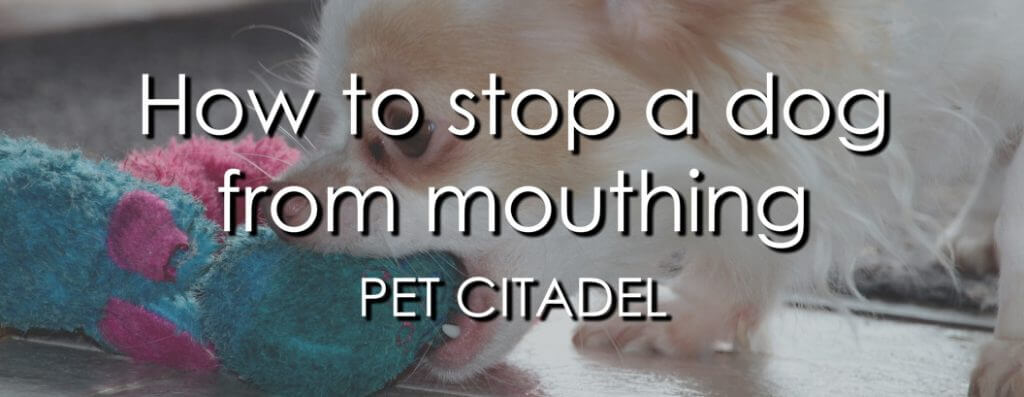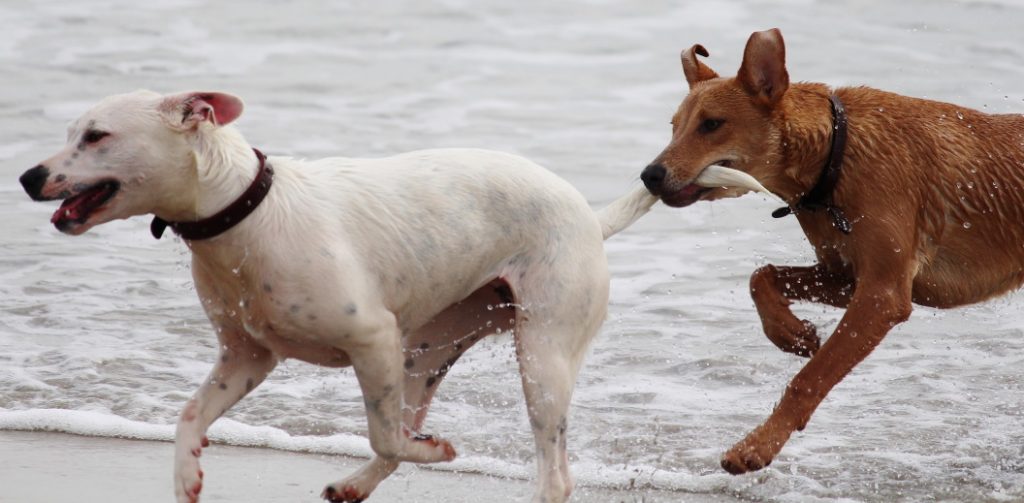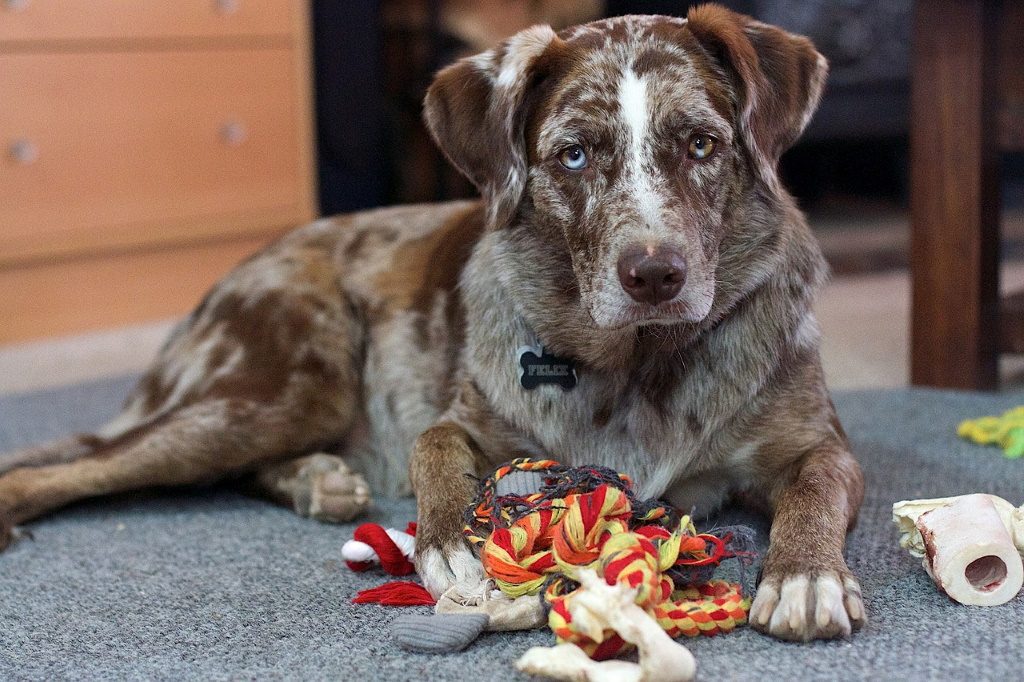This post may contain affiliate links. You can view our affiliate disclosure here.

Sometimes, a dog might put its mouth and teeth over a person’s skin (arm, hand, etc.), applying little or no bite pressure. This is known as mouthing.
Mouthing is usually not an aggressive act and is a natural behaviour for many dogs.
Understanding Mouthing
Have you ever watched dogs playing? They may rush about pretending to bite each other. They are play fighting, and as a puppy grows, it learns how hard it can bite (for closely related biting issues, see this page) without causing pain to its playmates.
This playing is both a way to keep entertained by having fun with other dogs and also a learning process in how to fight for real if needed.
Your dog hopefully sees you as another friend, someone it can play with. When you return home, for example, it may get excited and want to play with you, so it exhibits some of the same behaviors that it exhibits with other dogs because it sees you as a friend.
The trouble is that while the skin of its playmate is covered in fur and padded to a certain extent, the human hand is far more sensitive. Your dog has to learn how much pressure it can safely apply.
Is mouthing aggressive?
When your dog “mouths” you, it’s generally not being aggressive; rather, it’s expressing affection or joy at seeing you and spending time with you.
Dogs do not have the ability to vocalize their emotions, so they have to demonstrate their feelings. Jumping up, licking and gently mouthing are ways that your dog tries to show you how happy it is to see you and to be with you.
Mouthing is far from being aggressive, but unfortunately, some people get scared when their dog grasps their limb, even though the dog is not squeezing hard or hurting them.
Because of this, many people want to stop this behavior and ask how to stop a dog from mouthing.
An Alternative View

In our research on this topic, we’ve found two distinct viewpoints to the mouthing question.
Some people, as already mentioned, want to stamp out mouthing habits within their pet and instill more socially acceptable ways of the dog greeting people.
Others see mouthing as a harmless, natural canine behavior and feel that a dog including you amongst its friends and treating you accordingly should be encouraged.
It is no doubt a good thing when your dog sees you as a friend. The issue lies with our social norms.
Are we okay with our dog greeting people like this? Will our friends get afraid or annoyed if the dog mouths them?
How To Stop A Dog From Mouthing
1. Teach your dog a better way to greet people.
One of the nicest things about having a dog is seeing the wonderful greeting that the dog will give its owner when they return home.
Nobody wants to stop our dogs from being happy when we get visitors or when we return home. But you can teach your dog to express these emotions in a different way.

The first way to stop the mouthing is by introducing a kind of displacement activity.
One proven way of tackling the matter of a dog who mouths guests as a greeting is to keep a box of dog toys by the front door.
Before you open the door to your guest on the other side, give the dog a toy to hold. If the dog has a toy, it can’t mouth the visitor.
It will take a good deal of repetition to instill this new behavior in your dog. At first, it may simply drop the toy and go back to mouthing.
Correcting the dog and giving it the toy back will gradually make the dog realize that it’s supposed to be showing the visitors its toy and not mouthing them.
Alternative Distractions
When your dog tries to mouth your hand, produce a treat, snack or toy with your other hand to distract them.
Using this method, you can gradually break the mouthing cycle and make it possible for the dog to spend time with you and play with you without feeling the need to mouth.
It’s important not to shout at the dog when they try to mouth, as they likely won’t understand why you’re frustrated. To them, mouthing is a good thing and they will expect you to understand that.
2. Try the “yelp” method.
Allow your dog to mouth you, and the moment it applies any pressure on your skin, let out a sharp yelp and remove your hand quickly. The dog will assume it has hurt you and should back off.
Repeat this process every time it mouths you, and your dog will start to get the idea that you don’t like mouthing.
3. Use a taste deterrent.

If the yelp method doesn’t work, then there’s another thing you can try.
Before you allow the dog to mouth you, cover your hand in something bitter (lemon juice is good). The dog will try to mouth you and instantly decide it is not enjoyable.
If you use a deterrent enough times, the dog will develop new ways of interacting with you.
4. Use a spray.

If the yelping method and the taste deterrent don’t work, then there is another method you can use as a last resort.
When your dog starts to mouth you, yelp and at the same time give the dog a quick burst of peppermint breath spray (avoid the eyes).
The dog won’t like the spray, and after it has received this treatment a few times, it will be less inclined to mouth you.
Conclusion
Unlike some other issues that need correction with your dog, with mouthing, you are tying to stop what the dog perceives to be good behavior. You are trying to stop your dog from treating you as a friend.
This is why the training must be as gentle as possible, and at no stage should you shout at the dog. To do so may cause confusion and unnecessary stress in the dog.
Here’s a summary of the strategies we discussed:
- Displacement or replacement activities.
- Trying to make the dog think that mouthing hurts you.
- A taste deterrent such as lemon juice.
- A short, sharp, mild punishment as a last resort.
We recommend that you work through these strategies in the order that they’re presented.
Now, it’s possible that you won’t be able to fix the problem yourself. In some cases, mouthing can be excessive and a sign of aggression. If this is the case, or if you want professional help, there is a very economic solution available.
A certified dog trainer with well over a decade of experience working with clients has created an online program and community for dog owners.
He is known as Doggy Dan, and he has figured out that dog behaviours such as excessive mouthing fundamentally boils down to learning how to calm your dog down so it can regain control of its emotions.
This dog training package is substantial, and it costs a tiny fraction of what you would pay for the services of a typical dog trainer or behaviourist.
Alternatively, you can read my review of the program.
Thanks for reading this guide. Does your dog do a lot of mouthing? Feel free to share your experiences or ask questions in the comments below.




I have a 9 week old male teddy bear and he is mouthinh,mouthing, sharp teeth draw blood.
He is afraid of my husband and either mouthed I r snapped at him.ive tried to socialize with a neighbor and he clings on me.
Your husband needs to take a bigger role in this pups life. Husband has to feed and water the dog and spend time down on the floor and ground so this pup can get his scent and begin to have a relationship with the dog. And the wife needs to not shelter the dog when things go wrong , do not hold or pick up the puppy when it’s scared but offer soft talk and a calm place to settle down.
I am a retired Canine Behavior Expert.
make sure peppermint spray doesn’t have artificial sweeter like xylitol
Good tip!